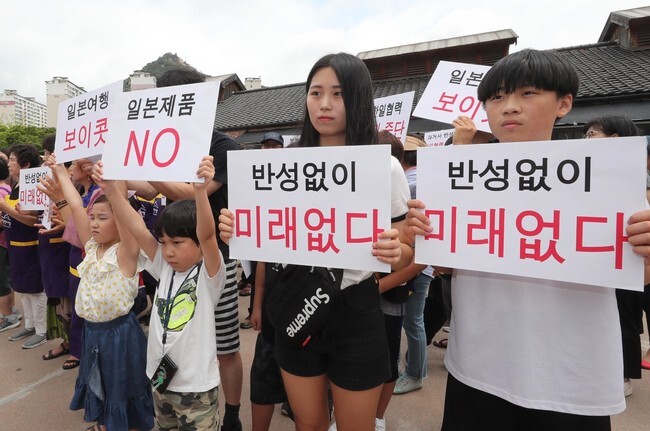hankyoreh
Links to other country sites 다른 나라 사이트 링크
Japan drafts proposal for solving forced labor issue, Kyodo News reports

The Japanese government has framed a draft proposal for the South Korean government and corporations to set up a fund, nominally for “economic cooperation,” in which Japanese companies could participate so as to reach a breakthrough in the ongoing dispute between the two countries, Kyodo News reported on Oct. 28. This is the first news of a Japanese proposal to bring the
controversy to a conclusion. But since this proposal implies that Japan wouldn’t take responsibility for compensating the victims of forced labor, it’s probably still not palatable for the South Korean government and public.
Seoul and Tokyo have begun reviewing tentative proposals with the hope of ending their dispute, and one of the likely options involves setting up an economic fund, Kyodo News said in a report that quoted several sources connected with South Korea-Japan relations. The wire service said that the proposal to set up an economic fund was drafted by Japanese officials and that a number of proposals have apparently been brought up during the two countries’ deliberations.
According to the wire service, the proposal centers on South Korea and Japan creating a fund earmarked for mutual economic development, rather than being designed to compensate the victims of forced labor. That’s the same position taken by Japan when the two countries established diplomatic relations and concluded an agreement about outstanding claims in 1965.
Under this proposal, Japanese companies would provide funds in a way that doesn’t contradict the Japanese government’s position that the issue of compulsory mobilization has “already been resolved,” the wire service explained. But the Japanese government would not be making any contributions to the fund.
Kyodo News said that the proposal may have been inspired by recent comments by Takeo Kawamura, a senior member of the Japan–Korea Parliamentarians’ Union. “[South Korean] Prime Minister Lee Nak-yeon has urged us to put on our thinking caps. I think the deliberations should focus on spending money not on compensation but on building the future of South Korea-Japan relations ,” Kawamura said during an appearance on Tokyo TV on Oct. 24.
But it’s unclear whether the proposal will win over the South Korean government. Considering that Tokyo had been saying it was up to Seoul to come up with a solution to the forced labor issue, it’s significant that Tokyo is now trying to devise its own solution.
Proposal realistically difficult for Seoul to acceptBut this proposal would still be hard for Seoul to stomach, since it deviates from Seoul’s pledge to respect the South Korean Supreme Court’s judgment awarding compensation to victims of forced labor. Seoul’s “one plus one” proposal, which would have South Korean and Japanese companies jointly set up a fund, is predicated on respect for the court’s judgment.
Kyodo News said that talks between South Korea and Japan are likely to run to run into obstacles because of the major gap between their respective positions. South Korea wants to arrange something that amounts to compensation, while Japan doesn’t want to admit responsibility for compensation.
“A variety of potential solutions to the forced labor issue have been reviewed in deliberations between our two governments, but not this one. The Japanese government has never made us such an offer,” said an official in the South Korean government.
This official offered a pessimistic appraisal of the proposal. “The question of whether the Japanese take part in paying compensation to the victims of forced compensation is important. We have to bear in mind the spirit of the Supreme Court’s ruling.”
By Cho Ki-weon, Tokyo correspondent, and Park Min-hee, staff reporter
Please direct comments or questions to [english@hani.co.kr]

Editorial・opinion
![[Column] Life on our Trisolaris [Column] Life on our Trisolaris](https://flexible.img.hani.co.kr/flexible/normal/500/300/imgdb/original/2024/0505/4817148682278544.jpg) [Column] Life on our Trisolaris
[Column] Life on our Trisolaris![[Editorial] Penalties for airing allegations against Korea’s first lady endanger free press [Editorial] Penalties for airing allegations against Korea’s first lady endanger free press](https://flexible.img.hani.co.kr/flexible/normal/500/300/imgdb/original/2024/0502/1817146398095106.jpg) [Editorial] Penalties for airing allegations against Korea’s first lady endanger free press
[Editorial] Penalties for airing allegations against Korea’s first lady endanger free press- [Editorial] Yoon must halt procurement of SM-3 interceptor missiles
- [Guest essay] Maybe Korea’s rapid population decline is an opportunity, not a crisis
- [Column] Can Yoon steer diplomacy with Russia, China back on track?
- [Column] Season 2 of special prosecutor probe may be coming to Korea soon
- [Column] Park Geun-hye déjà vu in Yoon Suk-yeol
- [Editorial] New weight of N. Korea’s nuclear threats makes dialogue all the more urgent
- [Guest essay] The real reason Korea’s new right wants to dub Rhee a founding father
- [Column] ‘Choson’: Is it time we start referring to N. Korea in its own terms?
Most viewed articles
- 1New sex-ed guidelines forbid teaching about homosexuality
- 2OECD upgrades Korea’s growth forecast from 2.2% to 2.6%
- 3[Column] Life on our Trisolaris
- 460% of young Koreans see no need to have kids after marriage
- 5Months and months of overdue wages are pushing migrant workers in Korea into debt
- 6[Guest essay] Maybe Korea’s rapid population decline is an opportunity, not a crisis
- 7Presidential office warns of veto in response to opposition passing special counsel probe act
- 8Is Japan about to snatch control of Line messenger from Korea’s Naver?
- 9Bills for Itaewon crush inquiry, special counsel probe into Marine’s death pass National Assembly
- 10Hybe-Ador dispute shines light on pervasive issues behind K-pop’s tidy facade